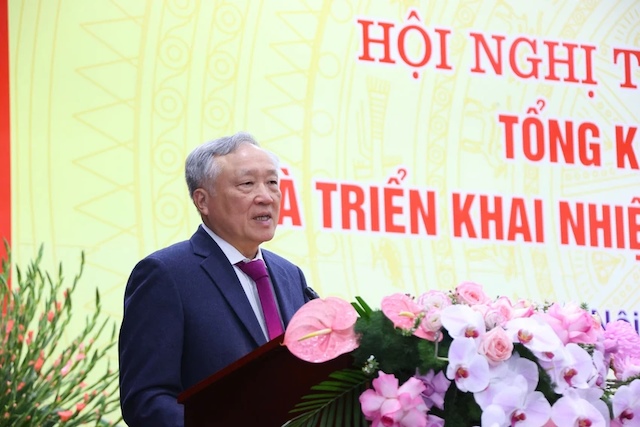On the morning of December 21, at the Ministry of Home Affairs’ summary conference, Deputy Prime Minister Nguyen Hoa Binh spent a significant amount of time addressing the issue of reorganization and streamlining the organizational structure.
Removing the Lazy and Attracting Talented Individuals to the Public Administration
Mr. Nguyen Hoa Binh shared that he, along with the leadership team of the Ministry of Home Affairs and advisory groups, have held numerous meetings to discuss policies for officials and civil servants. “Today, we have to submit our proposals to the Politburo for their review and approval regarding policies for the reorganization and streamlining of the apparatus. Our team has put in a lot of effort,” Mr. Binh said. He added that he doesn’t know when the Politburo will approve it, but he personally feels very assured and confident.
Mr. Nguyen Hoa Binh provided information about the number of officials, civil servants, and public employees affected, which is approximately 100,000 people. However, if the Ministry of Home Affairs’ proposals are accepted by the Politburo, these policies will be exceptionally superior and robust, ensuring the rights and benefits of officials and civil servants.

Deputy Prime Minister Nguyen Hoa Binh giving directives at the conference. Photo: XD
|
Additionally, the Deputy Prime Minister noted some existing shortcomings and limitations that need to be addressed in the future. He requested the Ministry of Home Affairs to continue finding ways to attract, retain, train, and offer competitive benefits to talented individuals. He emphasized the importance of “evaluating officials accurately for proper placement.”
“These are tasks that haven’t been performed very well up to this point. Among many tasks, the Ministry of Home Affairs must accomplish this one” – said the Deputy Prime Minister, conveying his expectations and hopes. He also quoted the General Secretary, saying, “we must eliminate lazy individuals from the apparatus and attract talented people to the public administration.”
“As we are undergoing a revolution in terms of organizational structure, perhaps it’s time to consider a revolution in personnel work as well. Because no matter how scientific, streamlined, or rational the apparatus is, its effectiveness is determined by the people within it,” continued Deputy Prime Minister Nguyen Hoa Binh.
He provided an example to illustrate his point: “If two departments or two offices are merged, and both leaders are mediocre, then the resulting department or office will also be mediocre. But if one is mediocre and the other is excellent, and the mediocre one is placed in charge, then both will suffer.”
“Therefore, accurate evaluation and proper placement of officials are what the Party, the State, and the people are expecting us to revolutionize,” added the Deputy Prime Minister.
Party Agencies to Take the Lead by February 10, 2025
Regarding the tasks for 2025, Deputy Prime Minister Nguyen Hoa Binh emphasized six key points. First, the reorganization and streamlining of the political system’s organizational structure, in accordance with Resolution 18 of the 12th Central Committee, is being carried out with great urgency, determination, and resolve.
“This is a task for the entire system. While the Ministry of Home Affairs plays a crucial advisory role, the responsibility lies with all ministries, sectors, and localities, not solely on the shoulders of the Ministry of Home Affairs,” Mr. Nguyen Hoa Binh noted.
The Deputy Prime Minister mentioned that the plan must be executed promptly, with Party agencies taking the lead by February 10, 2025. “Next week, the Politburo will make conclusions to immediately implement this. Public opinion is focused on the merger of ministries, but there is a particularly important task: all ministries and localities must also streamline their internal structures to reduce at least 15-20% of organizational units. In some cases, the Government requires a reduction of up to 40%,” said the Deputy Prime Minister.
He requested that ministries and localities take the initiative in proposing plans to streamline their internal structures. Specifically, for the Ministry of Home Affairs, the Deputy Prime Minister outlined four critical tasks. First is the development of a streamlined and efficient model for the apparatus, which is currently in progress. The central-level merger will serve as a basis for local-level mergers.
Second is the creation of mechanisms and policies that are sufficiently attractive, encouraging, and supportive for employees who choose to retire early. Third, a legal framework must be established for the new apparatus to function effectively. This includes resolutions of the National Assembly, decrees of the Government, functions and tasks, regulations, and more, all of which fall under the responsibility of the Ministry of Home Affairs. Fourth, the Ministry of Home Affairs should provide guidance to localities and sectors in this endeavor.
“The Ministry of Home Affairs serves as an advisory body to the Government and even the Politburo, so it must quickly and scientifically carry out these tasks. While we innovate to move forward, we must also remain calm to prevent risks and manage them effectively. A skilled leader is one who knows how to take charge and anticipate and mitigate potential risks and consequences,” added Mr. Nguyen Hoa Binh.
According to Mr. Binh, one identified risk is the avoidance of mechanical mergers, as there may be instances where mergers are not logical. “This is a challenging task, and we must minimize risks as much as possible. We have to proceed cautiously, making adjustments along the way, understanding that we may not achieve everything at once, but we must keep risks to a minimum,” shared the Deputy Prime Minister.
Another risk highlighted by the Deputy Prime Minister, quoting the General Secretary, is “not allowing state agencies to become a haven for lazy individuals.” Therefore, the Ministry of Home Affairs should be cautious in their reorganization to prevent a situation where “talented individuals choose to leave, while mediocre ones remain.”
He emphasized the importance of balancing supply and demand while retaining the best and brightest in the public administration—those who are truly dedicated, experienced, and competent. “This is a challenging equation, but we must strive to succeed. Otherwise, if all the talented individuals leave and only the mediocre ones remain, we will not achieve success,” said the Deputy Prime Minister.
He also advised localities and sectors to ensure that during the reorganization process, the apparatus continues to function smoothly and serve the people without interruption, and to make every effort to prevent any negative consequences…
D. MINH N. THAO
The Ministry of Home Affairs: Information on Provincial Mergers Shared Online is Inaccurate
The spokesperson for the Ministry of Home Affairs, Vu Dang Minh, has refuted the information and images circulating on social media regarding the rearrangement and merger of provinces in Vietnam. He asserted that these claims are inaccurate and should not be considered reliable.
Unlocking Opportunities: Five Key Areas for Vietnam-Hong Kong Collaboration
The 9th Belt and Road Summit took place on September 11-12 in Hong Kong, China, attracting nearly 6,000 delegates representing leading governments, corporations, and businesses from 70 countries and economies. At the invitation of the Chief Executive of the Hong Kong Special Administrative Region, John Lee, Deputy Prime Minister of Vietnam, Nguyen Hoa Binh, led the Vietnamese delegation to the Summit.


















